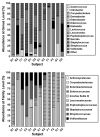Intestinal microbial ecology in premature infants assessed with non-culture-based techniques
- PMID: 19783002
- PMCID: PMC3628625
- DOI: 10.1016/j.jpeds.2009.06.063
Intestinal microbial ecology in premature infants assessed with non-culture-based techniques
Abstract
Objectives: To use high throughput techniques to analyze intestinal microbial ecology in premature neonates, who are highly susceptible to perturbations of the luminal environment associated with necrotizing enterocolitis (NEC) and late-onset sepsis.
Study design: With non-culture-based techniques, we evaluated intestinal microbiota shortly after birth and during hospitalization in 23 neonates born at 23 to 32 weeks gestational age. Microbiota compositions were compared in 6 preterm infants in whom NEC, signs of systemic inflammation, or both developed with matched control subjects by using 16S ribosomal RNA pyrosequencing.
Results: Microbial DNA was detected in meconium, suggesting an intrauterine origin. Differences in diversity were detected in infants whose mothers intended to breast feed (P = .03), babies born to mothers with chorioamnionitis (P = .06), and in babies born at <30 weeks gestation (P = .03). A 16S ribosomal RNA sequence analysis detected Citrobacter-like sequences only in cases with NEC (3 of 4) and an increased frequency of Enterococcus-like sequences in cases and Klebsiella in control subjects (P = .06). The overall microbiota profiles in cases with NEC were not distinguishable from that in control subjects.
Conclusions: Microbial DNA in meconium of premature infants suggests prenatal influences.
Figures

Comment in
-
Clostridium perfringens and necrotizing enterocolitis.J Pediatr. 2010 Jul;157(1):175. doi: 10.1016/j.jpeds.2010.03.027. J Pediatr. 2010. PMID: 20434729 No abstract available.
References
Publication types
MeSH terms
Substances
Grants and funding
LinkOut - more resources
Full Text Sources
Other Literature Sources
Medical

